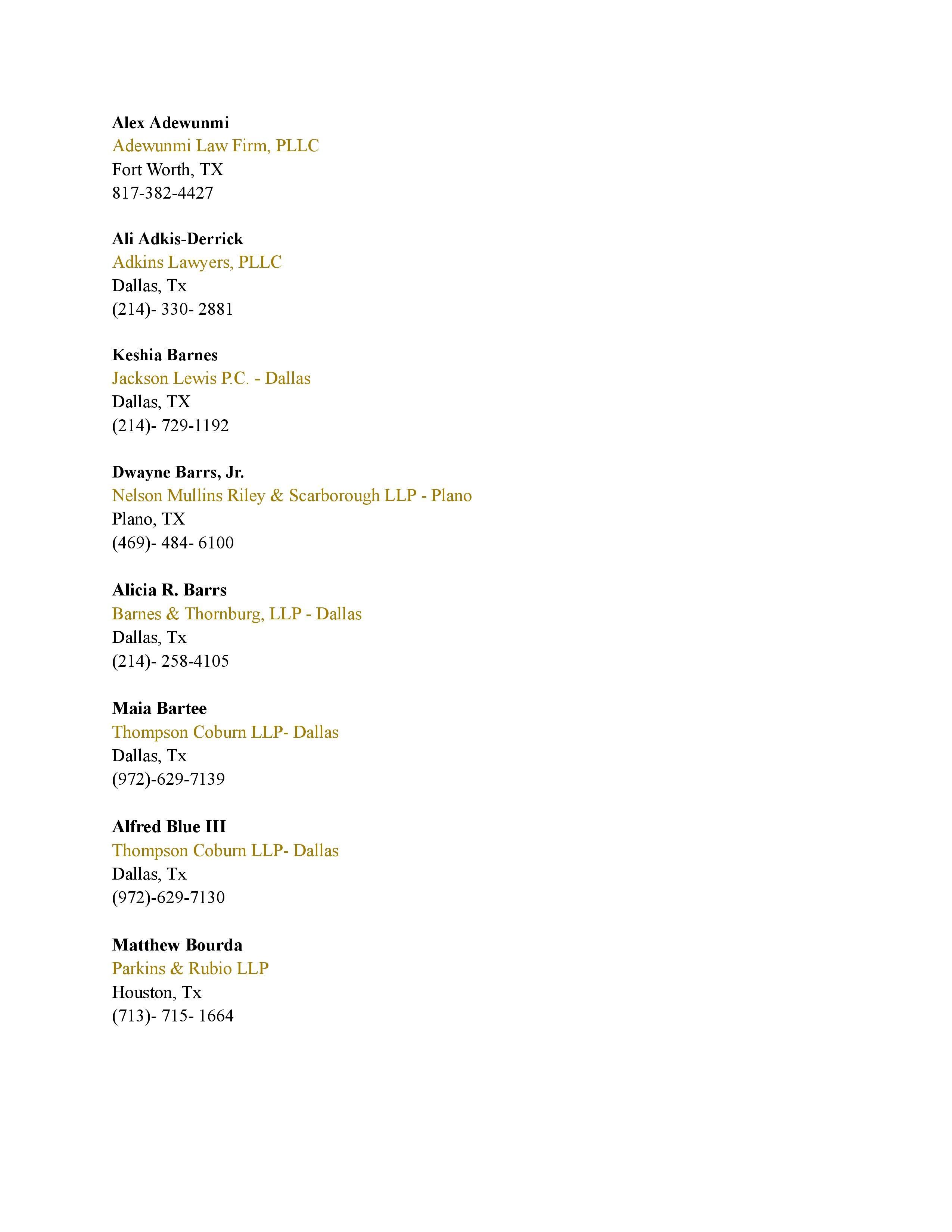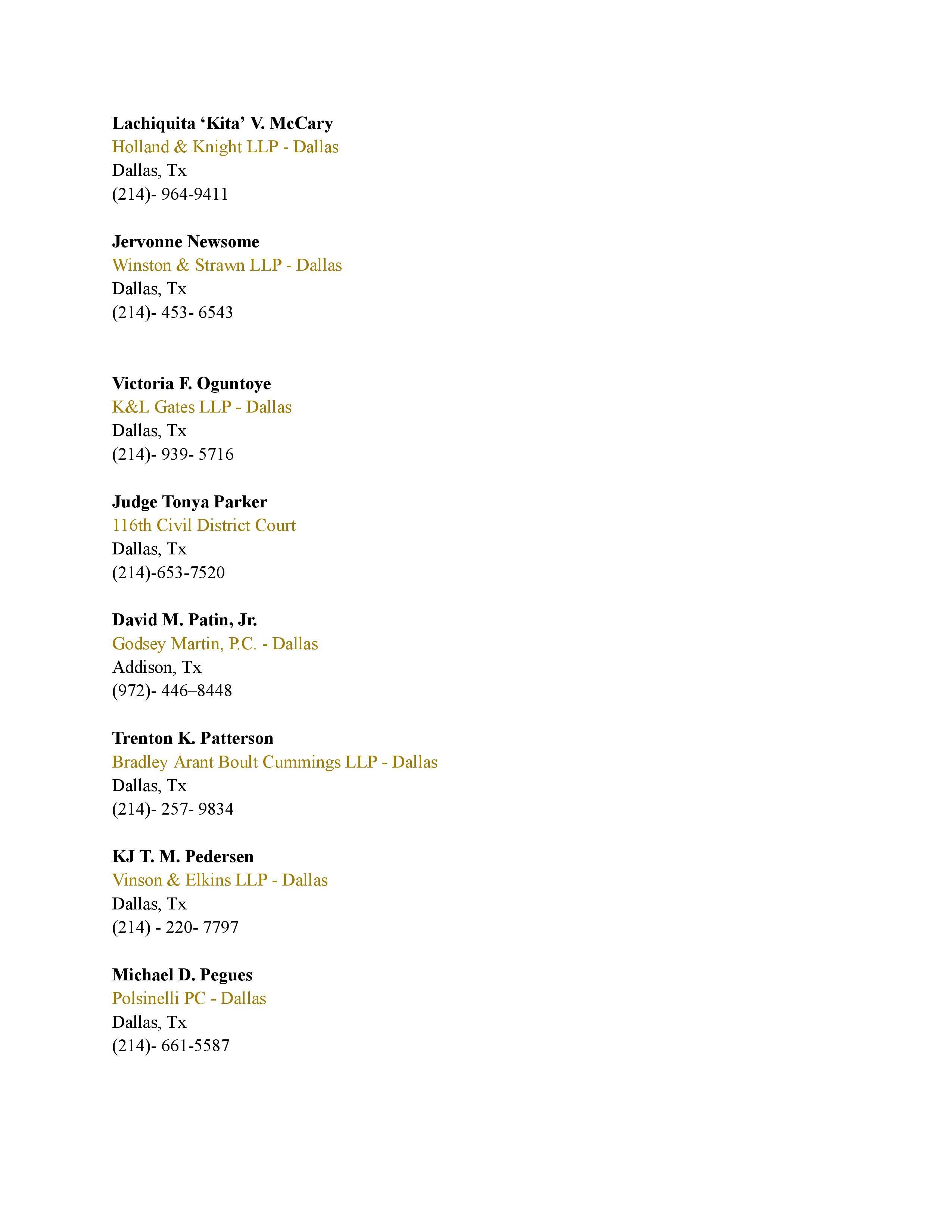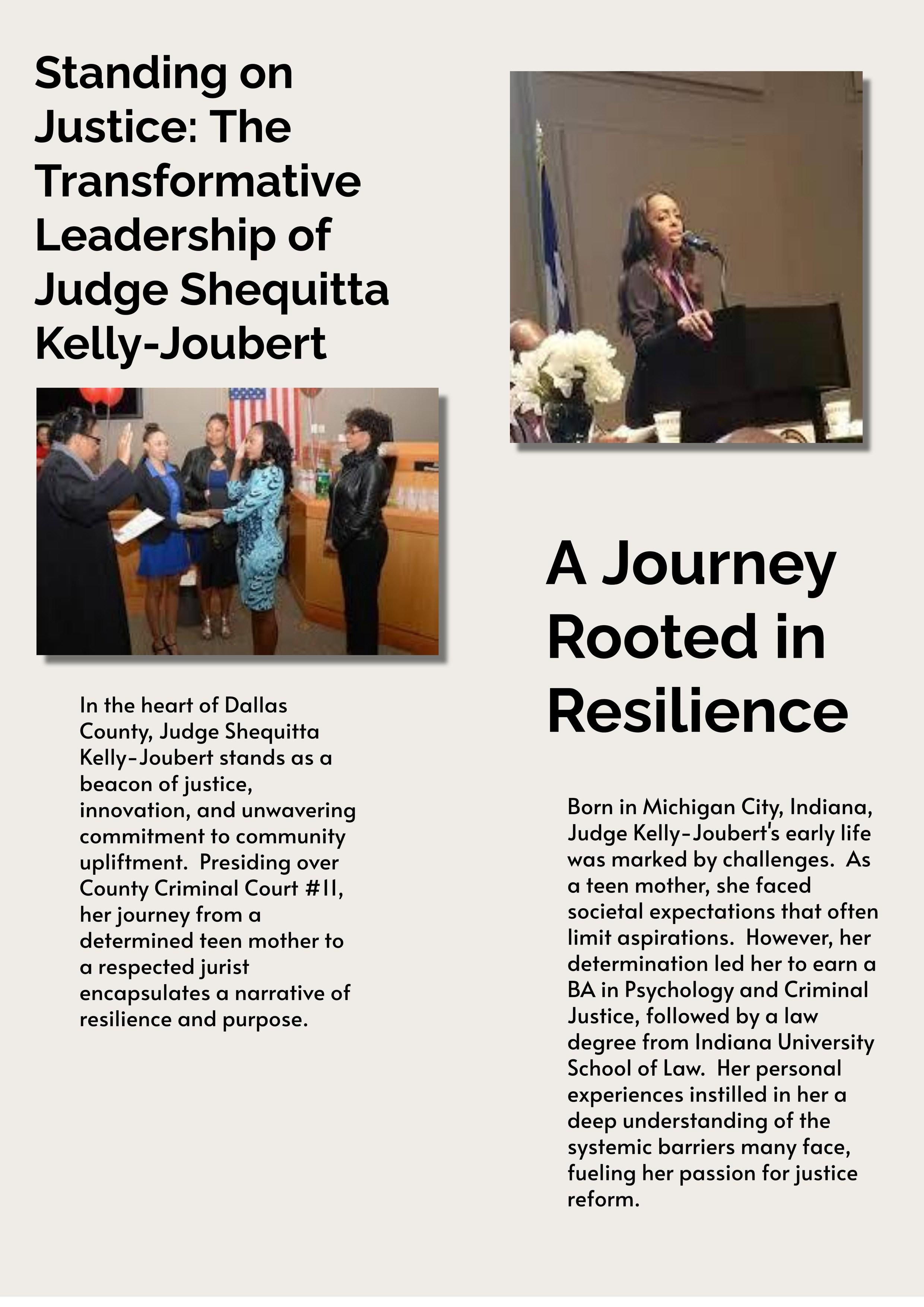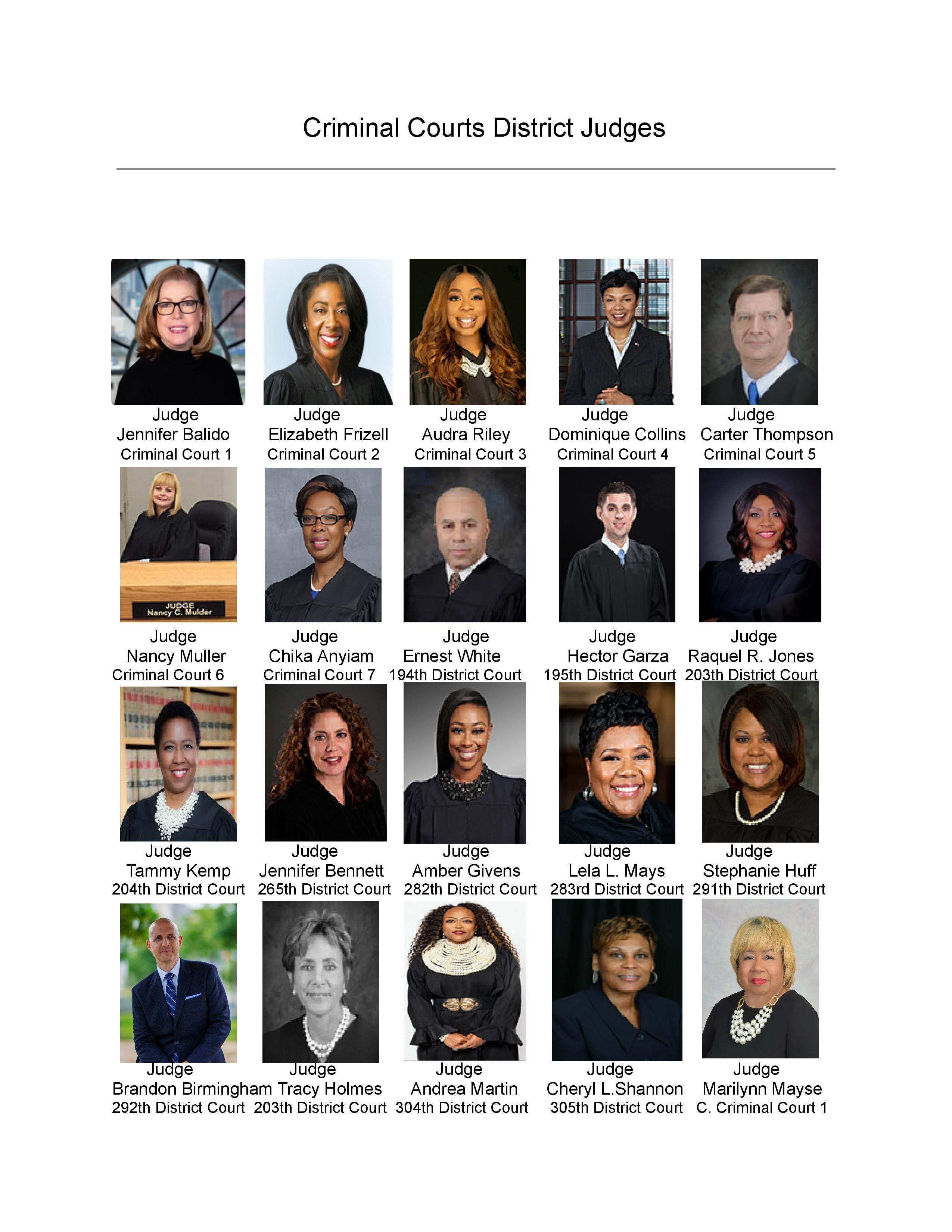Stefanie Major McGregor
is a Shareholder in the Dallas office of Godwin Bowman PC, focusing her practice on commercial litigation matters. She represents clients in both the prosecution and defense of a wide range of cases before state and federal courts around the country. Stefanie's practice covers a broad range of areas, with an emphasis on complex litigation, environmental and oil and gas litigation, major family law disputes (custody, property division, etc.), property disputes, and disputes involving trusts and estates. Notably, she was an important member of the Firm's trial team in the successful defense of Halliburton in connection with all civil litigation and investigations concerning BP's Macondo well blowout in the Gulf of Mexico, the largest environmental lawsuit in the history of the United States. Stefanie clerked for the Louisiana Supreme Court for one year and later became a Senior Research Attorney. Reflecting the excellence of her practice, Stefanie has been honored six times with selection to Thomson Reuters' Texas Rising Stars, which recognizes the top young attorneys in the State of Texas. She received a J.D. from Loyola University New Orleans School of Law in 2002 and a B.S. in Political Science from Texas A&M University in 1999.




oversees our Mass Torts, Criminal, Employment and Civil Rights practice areas as well as leads our While Larry is active daily in Mass Tort litigation he continues to play a role in client communications, and those cases that involve everyday He is an active coach in youth sports and sits on a number of diverse community stakeholder entities.
Between growing up in Duval County Florida and Harris Ward, Acers Homes, Greenspoint) and raising his kids in rural Texas, Larry has gained an appreciation for those who struggle for a sense of fairness. From the client in urban America seeking to be heard, to the small town rural American wanting fairness, it all resonates with Larry's need and desire to fight for them.
Having once needed a lawyer to represent him against a goliath of a corporation, he understands the complexities and care needed to make sure his clients are informed and made comfortable during the most vulnerable time of their Thurgood Marshal School of Law, 2008 Texas A&M University, College Station
Attorney Calvin D Johnson law firm focuses on Criminal Defense, Education Law, Auto Accidents and lifting traffic warrants and Citations.
Experience
Johnson has experience with cases from low level misdemeanors all the way up to capital murder charges.
Practice Areas
Some of his main practice areas include criminal defense, misdemeanors, felonies state and federal cases, education and school law, Texas Education Agency Investigations, Texas Education Agency Appeals, Terminations, Grievances, CPS Investigations Office of Professional Responsibility Investigations (OPR) and Auto Accidents
Office Address
3131 McKinney Ave, Suite 600, Dallas, Texas 75204. He can be reached at 214565-5600 and his fax number is: 214-484 -8316. You can contact him by email at Attorneycalvindjohnson@gmail.com
At Redmond and Eiland, PLLC, we take justice seriously. That is why we deal with many practice areas. We understand that dealing with an unexpected injury or a criminal charge can be stressful and expensive. Our firm offers a free case review that will provide you with the answers you deserve.
The lawyers at Redmond and Eiland, PLLC are dedicated to protecting your rights every step of the way, whether your were involved in an accident or dealing with a criminal matter. You can rest assure that we will thoroughly investigate your case to gather the evidence we need to achieve the results you deserve.
Our clients rest easy knowing that our attorneys will provide them with honest legal advice throughout their entire case process.
Redmond & Eiland, PLLC
1910 Pacific Avenue Suite 5050 Dallas, TX 75201
Email: info@redlandlaw.com
Office: 469.301.2400
Facebook: @redmondeiland
Instagram: @redmondeiland
Twitter: @redlandlaw
If you've ever hired a lawyer, you may have been staggered by the costs involved. Why do lawyers cost so much?
Attorneys can easily demand thousands of dollars and charge $200 or $300 per hour to take your case. Some charge up to 40% off the top of any settlement or verdict you get. So if you are injured in an accident, your lawyer may get almost half of everythingyouareentitledto.
However, if you ask any lawyer, they may tell you that their costs are fair. In fact, many will lament that they are underpaid. Here's a look at some reasons lawyers charge what theydo:
Research and writing takes time.
If you only receive a one-page document or a brief response to a legal question, you may wonder what you just paid for. However, the seemingly simple response that you get may be the result of hours of work researching every aspect of your legal issue. Lawyers use their expertise to explore every avenue and weigh every risk involved in a decision. As a result, the end product you see may not reflect all the behind-the-scenes considerations the attorney made in coming to a conclusion. Also, if all you wanted was a simple answer to your legal question, you were likely spared the expense of a more detailed answer (which would have required more time and would cost evenmoremoney).
Access to legal research tools.
Mostlawyersaccesscases,opinions, andstatutesthroughtheuseofsome online legal research tool like Westlaw (which, like FindLaw, is owned by Thomson Reuters). These tools are much more expensive than you might imagine and lawyers set their rates in order to be able to cover these costs and more, and earn a living.
Staffing and overhead costs. Someone needs to pay the secretary, the receptionist, the paralegal, and the rent/utilities/other office expenses. Law firms only make money from the work attorneys do, so everyone else in the office, and the office itself, reliesonanattorneybillings. So how can you avoid these high hourly rates? You can try to take advantage of some lawyers' free consultations, but there's typically only so much you can discuss before your free time is up. Also, keep in mind that free consults are usually used by attorneys as a way to get clients in the door for the purpose of signing up new clients, so don't expect to walk away with a lawyerletter,ormuchmorethan information on what you can do next (which will usually involve hiring that lawyer, if they want yourcase).
If you're searching for a more affordable lawyer, often solo practitioners (lawyers thatpractice withoutlawyerpartners, and often with minimal staff) can offer the best, most competitive (lowest) hourly and contingency rates. This is due to the fact that solo attorneys tend to have the lowest overhead.
If you've already retained a lawyer, the best way to cut back on costs is to stay on top of things: Bring all necessary documents to your meetings and hearings, promptly reply to your lawyer's requests, and make a list of questions to ask all at once. Also, don't be afraid to ask your attorney what you can do to reduce the costs. Time is money, especially when it comes to lawyers, so make sureyou spend it wisely.
By Andrew Lu
Class action lawsuits provide
harmed people with many benefits, such as allowing large groups of similarly affected people to come together and file a lawsuit against the same company. This provides strength in numbers for all of the people harmed, typically by large corporations, or businesses that have a vast reach.
These types of lawsuits support individual claimants who would otherwise not have the means to pursue a claim on their own. But when groups of people harmed by the same company come together and file as one group, they have the opportunity to hire an attorney to seek justice from the negligible party.
What Is a Class Action Lawsuit?
When a group of people who have been injured in a similar manner file a single lawsuit to seek compensation as a group, this is known as a “class action lawsuit.” You may also hear these types of cases referred to as “multi-district litigation” or “mass tort litigation.” Often, these cases are filed against manufacturers whose negligence caused injuries to consumers.
Why Do People File Class Action Lawsuits?
Class action lawsuits can give your seemingly small claim more opportunities when combined with other similarly affected people. In turn, class action lawsuits help the courts by not having to hear every single small claim that comes their way. People can file these types of lawsuits for a variety of reasons that cause harm, such as:
• Defective medication
• Illegal business practices
• Employee discrimination
• False advertising
• Breach of contract
There are many ways you can benefit from a class action lawsuit, and working with class action lawsuit lawyers can make this daunting process far more manageable.
What Are the Benefits of Class Action Litigation?
When you pursue litigation during a class action lawsuit, it will not cost you nearly as much as if you attempted to file an individual claim. That is because all of the plaintiffs are splitting the costs equally. This helps to cut costs for all parties. Plaintiffs will likely also pay on a contingency fee basis, which means there are no fees unless you win the case.
After you spend thousands going up against a large company, your claim could end up only being worth a few hundred dollars. Class action lawsuits help victims avoid this risk.
Depending on the case’s judgment, the plaintiffs may receive awards for financial compensation. While class action lawsuits may include many plaintiffs, that does not stop each member from receiving damages. For instance, in the Camp Lejeune water contamination lawsuit, the victims can receive monthly compensation up to $3,000, depending on their disability rating and other factors. Veterans who experienced the most serious disabilities can also receive extra monthly compensation.
When looking into financial compensation, it is important to consider when to sue the business with your fellow plaintiffs. That is because there is a risk of the company or defendant going bankrupt. You may want to try to join a class action lawsuit sooner than later, as the first group of plaintiffs to file may be the only ones who receive compensation.
How Can I Get Compensation with Class Action Lawsuits?
Once you have started a litigation process with the lead plaintiff taking legal action with your group’s attorney, the road to potentially earning financial compensation is easier for you and your loved ones.
Is a Class Action Lawsuit Worth It?
Even in cases with minor damages, it may be worth your time, money, and resources to join a class action lawsuit. If you have minor injuries or other damages from a large company’s negligence, these issues can affect many other people, too. A class action lawsuit can allow you to pursue financial compensation for your damages.
Additionally, the cost of hiring an attorney for your lone damage against a large company might not make sense financially.
Through class action lawsuits, going to court with multiple plaintiffs fractionalizes the cost compared to filing on your own. The court will still hear your voice and issues, regardless of how small your damages are. You and your attorney can begin to consider other affected party members and build a class action lawsuit.
Continue next page
How Do Class Action Lawsuits Work?
A class action lawsuit combines many claims into one, making the entire process much smoother and quicker for all parties involved. There will only be one judge operating under one courtroom.
During a class action lawsuit, the group of harmed people will assign their lead plaintiff to file the lawsuit on behalf of all party members. This lead plaintiff can also work alongside their lawyer during litigation and can communicate updates back to the entire group.
The lead plaintiff, or the class representative, allows the other party members to have a passive role throughout the litigation. This is efficient for the group’s attorney, too, who then only has to communicate with the class representative throughout the litigation.
How Do You File a Class Action Lawsuit?
To start or join a class action lawsuit, you will need to have a consultation with a lawyer who specializes in class action law to review your claim. If we determine you have a valid case, we will prepare and file a complaint on your behalf. We will guide you through the settlement process and fight to get you fair and adequate compensation.
How Do you Start a Class Action Lawsuit?
To start a class action lawsuit, your personal injury lawyer will file a claim with the court. In your claim, your attorney will formally request that the court certifies the potential claimants in your case as being their own class. Once that happens, other injured parties will be free to join your claim.Read More class actions | Federal Trade Commission (ftc.gov)
An Overview
A class action is a procedural device that permits one or more plaintiffs to file and prosecute a lawsuit on behalf of a larger group, or "class". Put simply, the device allows courts to manage lawsuits that would otherwise be unmanageable if each class member (individuals who have suffered the same wrong at the hands of the defendant) were required to be joined in the lawsuit as a named plaintiff. See Hansberry v. Lee, 311 U.S. 32, 41, 61 S.Ct. 115, 118 (1940).
Historically, various types of so-called “representative actions” have existed “since the earliest days of English law.” Ortiz v. Fibreboard Corp., 527 U.S. 815, 832, 119 S.Ct. 2295, 2308 (1999) (citations omitted). Class actions, however, are more a recent invention, created by English courts sitting in equity as “an exception to the usual rule that litigation is conducted by and on behalf of the individual named parties only ” Califano v. Yamasaki, 442 U.S. 682, 700-701, 99 S.Ct. 2545, 2557-2558 (1979). The “usual rule” referenced in Califano is more commonly referred to as the “necessary parties rule,” and it required that “all persons materially interested, either as plaintiffs or defendants in the subject matter of the bill ought to be made parties to the suit, however numerous they may be.” West v. Randall, 29 F. Cas. 718, 721 (No. 17,424) (C.C.D.R.I. 1820) (Story, J.) (italics added). As Justice Story explained
The reason is that the court may be enabled to make a complete decree between the parties, may prevent future litigation by taking away the necessity of a multiplicity of suits, and may make it perfectly certain, that no injustice shall be done, either to the parties before the court, or to others, who are interested by a decree, that may be grounded upon a partial view only of the real merits. Id.
Because when strictly enforced, the necessary parties rule “would at times unfairly deny recovery to the party before the court, equity developed exceptions, among them one to cover situations where the parties are very numerous, and the court perceives, that it will be almost impossible to bring them all before the court; or where the question is of general interest, and a few may sue for the benefit of the whole; or where the parties form a part of a voluntary association for public or private purposes, and may be fairly supposed to represent the rights and interests of the whole.'” Ortiz, at 83233 (citations omitted). Put simply, as society revolutionized the common law was ill-equipped to handle the new claims that followed: “Common law models of litigation that envision one plaintiff sparring with one defendant were not designed to and cannot cope with harm experienced by huge numbers of geographically dispersed people.” In re Joint Eastern & Southern Dist. Asbestos Litigation, 129 B.R. 710, 803 (E.D.N.Y. 1991), judgment vacated, 982 F.2d 721 (2d Cir. 1992) (“Asbestos Litigation”).
Originally, then, American courts followed the example of our British brethren, using their power in equity to avoid multiplicity of actions where numerous individuals sued a common defendant for the same legal wrong. In 1842, the Supreme Court promulgated Equity Rule 48, “officially recogniz[ing] representative suits where the parties were too numerous to be conveniently brought before the court, but refused to bind absent parties to any resulting judgments.” Asbestos Litigation, at 804. The Supreme Court explained this new rule as follows:
Read more
Class Action | Wex | US Law | LII / Legal Information Institute (cornell.edu)
Many people have found themselves in a scary situation where they are behind on their mortgage payments. You are not alone. When you get behind, you may not know what to do or who to turn to. For this reason, we have developed this stepby-step guide to give you the knowledge you need to move forward confidently.
Step One: Evaluate Your Financial Situation
When you are behind on your mortgage, it is important to take a moment to analyze your financial situation. You should consider why you were unable to make the payments you missed. Was there an unanticipated expense that occurred in the past few months? Has there been a change in your household’s income? Can you catch up on your past due amounts? Will you be able to make your future mortgage payments as they become due? These are some questions to think about. If you are able to bring your loan current, you should do so right away.
If you are unable to bring your account current, you need to go to Step Two.
Step Two:
If you want
to
keep your home, apply for a loss mitigation option.
Once you have evaluated your financial situation, you should contact your bank immediately. A representative from your bank should be able to provide you with the options they have available to address the problems you are facing with your mortgage. Depending on your situation, some of the following options or combination of options may be available from your bank:
Loan Modification: A loan modification is a long-term solution to meeting your financial needs. A loan modification will modify your current mortgage by reducing your monthly payments through a change in your interest rate and/or extending the term of your loan.
Forbearance: A forbearance agreement is a short term solution to bring your mortgage account current. A forbearance agreement is an agreement between you and your lender to reduce or suspend your monthly payments for a set amount of time. The lender will agree to delay foreclosure proceedings during this time, but you will eventually have to catch back up on the payments.
Reinstatement:
A reinstatement is a way for you to pay the past due balance of your mortgage and bring your account current. Once your mortgage account is reinstated and the past due balances are paid, you will continue your regular monthly mortgage payments.
Repayment Plan:
A repayment plan is a way for you to spread the amount you owe over a period of time. In a repayment plan, you pay your monthly mortgage payment in addition to the monthly past due amount under your plan.
If you apply for a loan modification or another loss mitigation option and it was approved, great! You can get back on track.
Lawyers will often provide a free or very low-cost consultation to discuss the details of your situation and give you an opportunity to ask some basic questions about the attorney. This meeting should not only help you decide whether to go forward with a lawyer in general, but also whether you should proceed with this lawyer. If you later decide to hire the lawyer, you will go into a more detailed discussion of your case and ask more specific questions along the way.
Generally speaking, you'll want to have a list of questions in mind to ask during the meeting. Also, you should feel comfortable enough asking questions that relate to the lawyer's expertise, experience, fees, special knowledge, and management of the case.
Below are ten questions to ask your potential lawyer.
How long have you practiced law? At a minimum, you'll want to know about the lawyer's expertise and whether the lawyer is a veteran or beginner attorney, for instance. Your legal issue may
very well be handled by someone who is fresh out of law school, (or not). It all depends.
What type of cases do you generally handle? What percentage of your practice is devoted to (the practice area in question)? You'll also want to know about a lawyer's expertise and how much of the attorney's practice is devoted to topic area your legal issue falls within. For example, if you need help with an adoption case, you may wish to seek a family law lawyer who has worked on, well, adoption cases.
Who is your typical client?
This is an important, but oftenoverlooked question. For example, if you are an individual with a particular legal problem, but the attorney your meeting with represents only corporations, this may not be the best lawyer for you. Likewise, you may wish to know the financial background of some of the lawyer's clients. This is because there may be different issues a lawyer is used to factoring when working with high net-worth individuals vs college students.
How many cases have you represented that were similar to mine? Now is not the time to act shy. Feel free to ask about the attorney's track record, such as the number of cases won or settled, for example.
Other than a law degree, what kind of special training or knowledge do you have that might apply in my situation? Some cases, like DUI and patent cases, require specialized training and knowledge for effective representation. Be sure to inquire whether your case fits into that category.
What are your attorney fees and costs, and how are they billed? Will a portion or all of my case be handled by paralegals or legal assistants? If so, ask about reduced costs. This step is obviously an important one. You'll want to know whether you can afford the lawyer's services and how you will be required to pay. This is also the time to ask about payment options and how often, and under what circumstances, you will be billed.
What is your approach or philosophy to winning or representing a case? This can be important in two ways. First, if you are seeking an amicable divorce, for example, but the attorney is known to "go for the kill" in divorce cases, the attorney may not be the right one for you. Similarly, if you're looking for an aggressive attorney to handle an upcoming corporate merger, for example, you'll want someone who isn't afraid to push the envelope, so to speak.
Are there others ways for solving my legal problem? Go ahead. Ask the professional whether there are any alternatives for solving your legal problem, such as through arbitration or some other out-of-court arrangement. A good attorney will generally inform you if your case can be handled through other less expensive and time consuming means.
If ARESTED PLEASE
TAKE NOTE OF THIS ADVICE.
A wide variety of people are arrested every day and the majority of the individuals make the same mistakes which make there situation even worse. Many of these reactions are understandable; however, some defy logic and reason. Nobody plans on being arrested, but you may be arrested for simply being in the wrong place at the wrong time. Share this with your colleagues, friends and family because it will come in handy for many of you. The basic rule is to simply listen to the officer and do as your told, “Put Your Hands Behind Your Back” and do NOT do any of these Ten Things
DON’TTALK. Do not say a word to the officer. You have a right to remain silent – take advantage of it. I cannot stress to you the importance of this rule. Do not talk! Do not attempt to convince the officer of your innocence. Everyone is innocent, no one should be arrested and no one should be in jail and that is all the officer hears all day every day. He/she does not care generally whether you are innocent or guilty and there is nothing that he / she can do at this point. Most times, when people speak to officers they say something that makes their situation far worse. Keep your mouth shut; there will be plenty of time to talk later.
DON’T RUN. I said above to listen to the officer and follow his/her instructions. If you run, not only could there be additional charges, but if the case goes to trial, then the Government may be able to get a special Jury instruction which would be
read to the Jury called “consciousness of guilt” whereby the Jury is told basically “guilty people run, innocent people don’t”. Also, police become highly suspicious that someone running has a weapon and may be quick to draw their weapon.
NEVER RESIST ARREST. Perhaps the most important thing not to do is touch the police officer at all! Follow what the officer says. Fight your case, not the officer.
DON’T BELIEVE THE LIES! It will only be easier for the police to prove their case.
NO SEARCHING. Do not allow the police to search anywhere! If the police officer asks, they do not have the right to search and must have your consent. If you are asked make sure you proclaim to any witnesses that “You (the police) do not have consent to search.” If they perform the search anyway, that evidence may be thrown out later. Also, if you consent to a search, the officers may find something that you had no idea you or someone else had placed there, i.e., marijuana left by a friend.
You will lose a fight against an officer. Many people attempt to bump the officer or swat an officers hands away. This often becomes over-reported by the officer and the swatting becomes hitting which falls under the assault statutes and now a minor.
DON’T BELIEVE THE POLICE –THEYLIE. It is perfectly legal for the police to lie to get you to make an admission. In fact they are trained to lie to you to get the confession. It is called the Reid Technique where you lie about having witnesses or video tape or fingerprints or DNA. The police frequently separate two friends and tell one the other one “ratted” him/her out (i.e., told on you). Because of the lie, the other friend now rats the first friend out. Police and detectives also state that “it will be easier” to talk now… LIES!!!
DON’T LOOK AT PLACES WHERE YOU DON’T WANT POLICE
. Police are trained to watch you and react to you. They know that you arenervous and scared and many people look to the areas that they don’t want the police to search. Do not react to the search and do not answer any questions. LOOK DOWN AND KEEP YOUR MOUT.
IF POLICE
COME
TO YOUR
HOME,
DO NOT LET THEM IN AND DO NOTSTEPOUTSIDE. If the police are confident you have committed a felony, they are coming in anyway, because they generally don’t need an arrest warrant. Make it clear to the police by stating: “No you may not come in”, or “I am comfortable talking right here”, or “You need a search warrant to enter my home.” If they return, your attorney can arrange for you to turn yourself in should that be necessary and you will spend no time in jail between the hearings. Read more www.BlacklwayersMagazine.com
















































